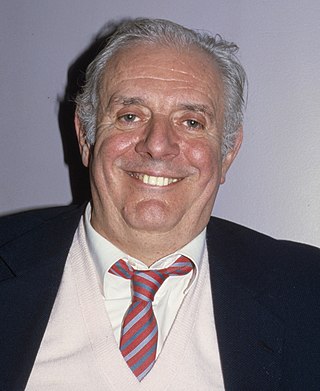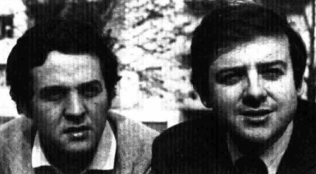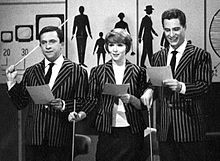
Dario Luigi Angelo Fo was an Italian playwright, actor, theatre director, stage designer, songwriter, political campaigner for the Italian left wing and the recipient of the 1997 Nobel Prize in Literature. In his time he was "arguably the most widely performed contemporary playwright in world theatre". Much of his dramatic work depends on improvisation and comprises the recovery of "illegitimate" forms of theatre, such as those performed by giullari and, more famously, the ancient Italian style of commedia dell'arte.

Franca Rame was an Italian theatre actress, playwright and political activist. She was married to Nobel laureate playwright Dario Fo and is the mother of writer Jacopo Fo. Fo dedicated his Nobel Prize to her.

Vincenzo "Enzo" Jannacci was an Italian singer-songwriter, pianist, actor and comedian. He is regarded as one of the most important artists in the post-war Italian music scene.

Alberto Lionello was an Italian film actor, voice actor, singer and presenter.

Loretta Goggi is an Italian singer, actress, and television presenter. Goggi's records have sometimes entered the Italian pop charts. She was the first runner-up at the 1981 Sanremo Festival with the song "Maledetta primavera", her most famous pop hit.
Archangels Don't Play Pinball is a 1959 two-act play by Dario Fo. The play uses the metaphor of a pinball machine—a new innovation in Italy at the time and one which Fo and his wife Franca Rame were fond of— to convey mechanisation and conspicuous consumption.

Antonio Lardera, better known by his stage name Tony Dallara, is an Italian former singer, actor and television personality.

Paolo Rossi is an Italian actor, writer, comedian, singer-songwriter and television personality.

Renato Pozzetto and Cochi Ponzoni are an Italian musical and comedy duo who works as Cochi e Renato.
This is a list of Italian television related events from 1988.
This is a list of Italian television related events from 1968.
This is a list of Italian television related events from 1966.
This is a list of Italian television related events from 1962.
This is a list of Italian television related events from 1958.
This is a list of Italian television related events from 1963.
This is a list of Italian television related events from 1977.
This is a list of Italian television related events from 1987.
This is a list of Italian television related events from 1956.
This is a list of Italian television related events from 1967.
This is a list of Italian television related events of 1975.









